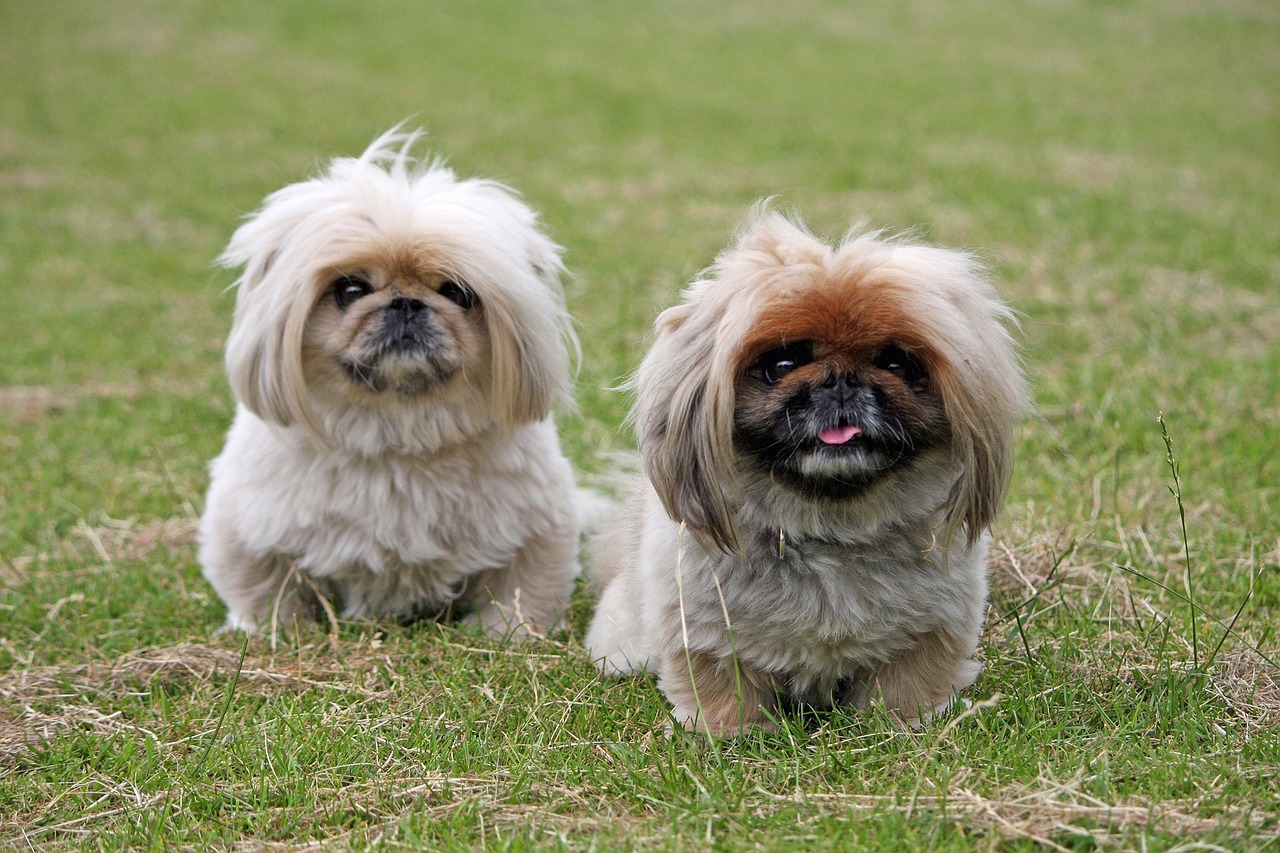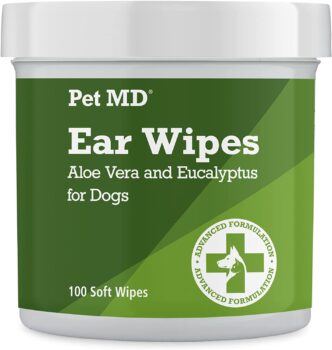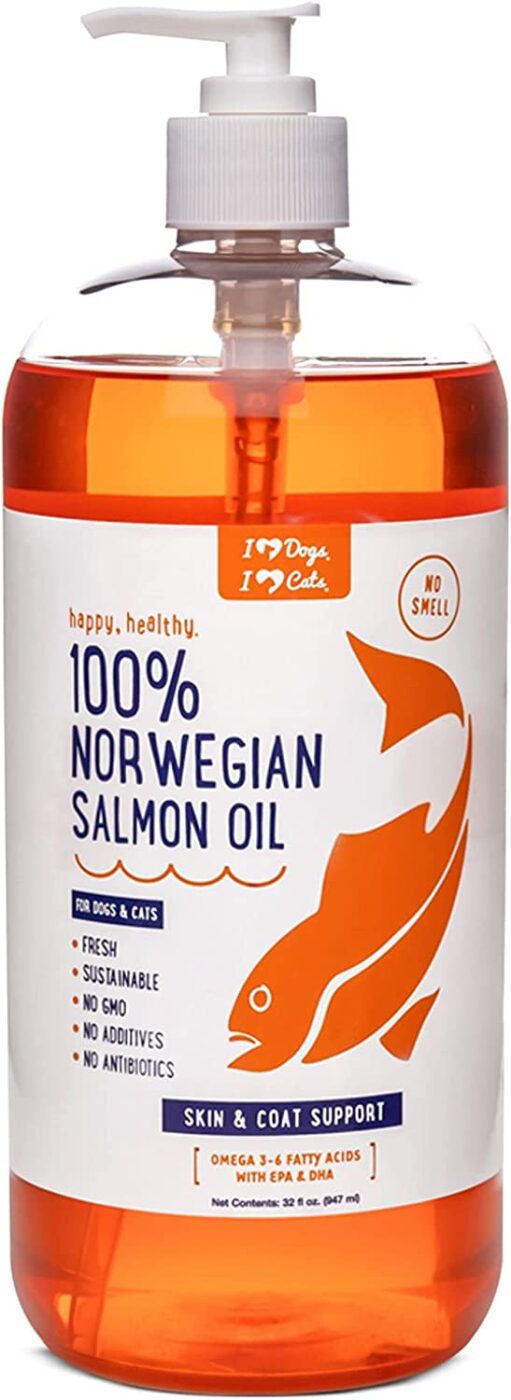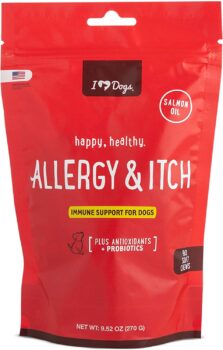Charming and affectionate, Pekingese dogs make delightful pets. Yet, like many dog breeds, they’re prone to ear infections. This article will explore 11 ways to treat and prevent ear infections in Pekingese dogs, emphasizing the importance of Omega-3 in their diet.

iHeartDogs is reader supported. Some of the links below may be paid affiliate links, where we receive a small commission on a product at no additional cost to you.
1. Regular Ear Cleaning and Checks
Keeping your Pekingese ears clean is crucial for preventing infections. Use a vet-approved cleaner and be careful not to over-clean, as it could lead to irritation.
Our favorite ear cleaner is these PetMD brand ear wipes on Amazon.
2. Dry Ears After Swimming or Bathing
Moisture in the ear canal can trigger bacterial growth and infections. Always dry your Pekingese ears thoroughly after swimming or bathing.
3. Incorporate Omega-3 Fatty Acids into Their Diet
Omega-3 fatty acids can help combat inflammation caused by allergies, a common cause of ear infections. Include Omega-3-rich foods, like fish and flaxseed, or Omega-3 supplements in your Pekingese diet.
We’re fans of this Norwegian salmon oil on Amazon. It’s a bright orangish-pink color and has no fishy smell at all due to its ultra-high purity.
4. Regular Veterinary Check-ups
Routine vet visits allow for early detection and treatment of potential ear infections, preventing them from escalating into severe conditions.
5. Identify and Avoid Allergens
If your Pekingese is allergic to certain substances, they might develop ear infections. Identifying and eliminating these allergens can help prevent this issue.
A few good supplements to help your dog’s allergies are apple cider vinegar, quercetin, and colostrum, all of which are found in many natural allergy supplements like this one.
6. Keep Up with Vaccinations and Parasite Control
Ensuring your Pekingese is up-to-date with vaccinations and regular parasite control can strengthen their immune system and decrease the likelihood of infections.
7. Use Vet-prescribed Medication for Existing Infections
If your Pekingese already has an ear infection, your vet will likely prescribe antibiotics or antifungal medication. Follow the prescribed treatment plan for best results.
8. Surgical Intervention for Chronic Cases
For chronic or severe ear infections, your vet may recommend surgical intervention to improve drainage and aeration in the ear canal.
9. Incorporate Probiotics in Your Pekingese’s Diet
Probiotics can enhance the gut microbiome, which in turn can boost the immune system and potentially lower the risk of ear infections.
10. Use an E-Collar During Treatment
An e-collar can help prevent your Pekingese from scratching at an infected ear, avoiding further irritation or damage.
11. Maintain a Clean Living Environment
Keeping your Pekingese living environment clean can help to prevent many health problems, including ear infections.
FAQs on Ear Infections in Pekingese
1. Q: What are the signs of an ear infection in Pekingese?
A: Symptoms include frequent scratching, head shaking, redness, swelling, unusual discharge, and a foul odor from the ears.
2. Q: Are Pekingese more prone to ear infections?
A: Pekingese, due to their ear structure, can be more susceptible to ear infections. However, individual factors, like allergies or a weakened immune system, also contribute.
3. Q: How often should I clean my Pekingese ears?
A: Healthy Pekingese ears should be cleaned once a week. If your Pekingese is prone to ear infections, they might require more frequent cleaning.
4. Q: Can Omega-3 prevent ear infections?
A: Omega-3 fatty acids can help manage inflammation caused by allergies, reducing the risk of ear infections.
5. Q: Can ear infections cause permanent damage in Pekingese?
A: If left untreated, ear infections can lead to complications such as hearing loss. Prompt treatment is crucial.
6. Q: Can I use human ear infection medicine on my Pekingese?
A: No, you should always use medication prescribed by your vet. Human medicines may not be safe or effective for dogs.
7. Q: What are common allergens for Pekingese?
A: Common allergens include certain foods, dust mites, pollen, and certain cleaning products.
8. Q: How can I incorporate Omega-3 into my Pekingese’s diet?
A: You can add Omega-3 to your Pekingese diet via Omega-3-rich foods or supplements.
9. Q: Can I prevent all ear infections in my Pekingese?
A: While it’s difficult to prevent all ear infections, the strategies outlined above can significantly reduce the risk.
10. Q: What should I do if my Pekingese ear infections keep recurring?
A: Recurring ear infections might indicate an underlying issue, such as allergies or anatomical abnormalities. A thorough evaluation and treatment plan from your vet is necessary in such cases.
In conclusion, prevention and early detection are key when it comes to ear infections in Pekingese. With these strategies, you can maintain the health of your Pekingese and ensure they remain the loyal and loving companion they are known to be.



 Toledo, United States.
Toledo, United States.